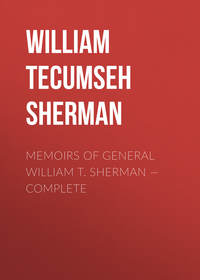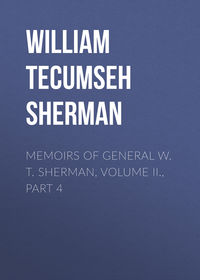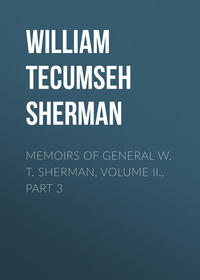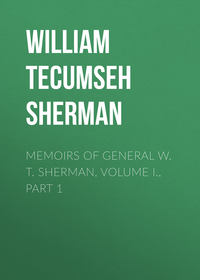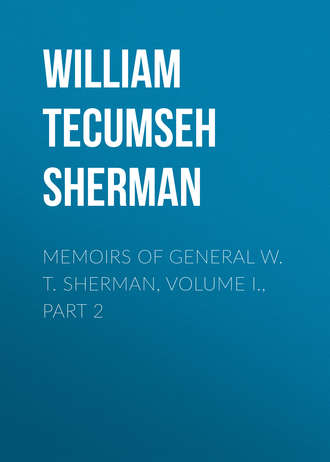 полная версия
полная версияMemoirs of General W. T. Sherman, Volume I., Part 2
Colonel Coon, of Wisconsin, a volunteer aide, also rendered good service during the day.
W. T. SHERMAN, Colonel commanding Brigade.
This report, which I had not read probably since its date till now, recalls to me vividly the whole scene of the affair at Blackburn's Ford, when for the first time in my life I saw cannonballs strike men and crash through the trees and saplings above and around us, and realized the always sickening confusion as one approaches a fight from the rear; then the night-march from Centreville, on the Warrenton road, standing for hours wondering what was meant; the deployment along the edge of the field that sloped down to Bull-Run, and waiting for Hunter's approach on the other aide from the direction of Sudley Springs, away off to our right; the terrible scare of a poor negro who was caught between our lines; the crossing of Bull Run, and the fear lest we should be fired on by our own men; the killing of Lieutenant-Colonel Haggerty, which occurred in plain sight; and the first scenes of a field strewed with dead men and horses. Yet, at that period of the battle, we were the victors and felt jubilant. At that moment, also, my brigade passed Hunter's division; but Heintzelman's was still ahead of us, and we followed its lead along the road toward Manassas Junction, crossing a small stream and ascending a long hill, at the summit of which the battle was going on. Here my regiments came into action well, but successively, and were driven back, each in its turn. For two hours we continued to dash at the woods on our left front, which were full of rebels; but I was convinced their organization was broken, and that they had simply halted there and taken advantage of these woods as a cover, to reach which we had to pass over the intervening fields about the Henry House, which were clear, open, and gave them a decided advantage. After I had put in each of my regiments, and had them driven back to the cover of the road, I had no idea that we were beaten, but reformed the regiments in line in their proper order, and only wanted a little rest, when I found that my brigade was almost alone, except Syke's regulars, who had formed square against cavalry and were coming back. I then realized that the whole army was "in retreat," and that my own men were individually making back for the stone bridge. Corcoran and I formed the brigade into an irregular square, but it fell to pieces; and, along with a crowd, disorganized but not much scared, the brigade got back to Centreville to our former camps. Corcoran was captured, and held a prisoner for some time; but I got safe to Centreville. I saw General McDowell in Centreville, and understood that several of his divisions had not been engaged at all, that he would reorganize them at Centreville, and there await the enemy. I got my four regiments in parallel lines in a field, the same in which we had camped before the battle, and had lain down to sleep under a tree, when I heard some one asking for me. I called out where I was, when General Tyler in person gave me orders to march back to our camps at Fort Corcoran. I aroused my aides, gave them orders to call up the sleeping men, have each regiment to leave the field by a flank and to take the same road back by which we had come. It was near midnight, and the road was full of troops, wagons, and batteries. We tried to keep our regiments separate, but all became inextricably mixed. Toward morning we reached Vienna, where I slept some hours, and the next day, about noon, we reached Fort Corcoran.
A slow, mizzling rain had set in, and probably a more gloomy day never presented itself. All organization seemed to be at an end; but I and my staff labored hard to collect our men into their proper companies and into their former camps, and, on the 23d of July, I moved the Second Wisconsin and Seventy-ninth New York closer in to Fort Corcoran, and got things in better order than I had expected. Of course, we took it for granted that the rebels would be on our heels, and we accordingly prepared to defend our posts. By the 25th I had collected all the materials, made my report, and had my brigade about as well governed as any in that army; although most of the ninety-day men, especially the Sixty-ninth, had become extremely tired of the war, and wanted to go home. Some of them were so mutinous, at one time, that I had the battery to unlimber, threatening, if they dared to leave camp without orders, I would open fire on them. Drills and the daily exercises were resumed, and I ordered that at the three principal roll-calls the men should form ranks with belts and muskets, and that they should keep their ranks until I in person had received the reports and had dismissed them. The Sixty-ninth still occupied Fort Corcoran, and one morning, after reveille, when I had just received the report, had dismissed the regiment, and was leaving, I found myself in a crowd of men crossing the drawbridge on their way to a barn close by, where they had their sinks; among them was an officer, who said: "Colonel, I am going to New York today. What can I do for you?" I answered: "How can you go to New York? I do not remember to have signed a leave for you." He said, "No; he did not want a leave. He had engaged to serve three months, and had already served more than that time. If the Government did not intend to pay him, he could afford to lose the money; that he was a lawyer, and had neglected his business long enough, and was then going home." I noticed that a good many of the soldiers had paused about us to listen, and knew that, if this officer could defy me, they also would. So I turned on him sharp, and said: "Captain, this question of your term of service has been submitted to the rightful authority, and the decision has been published in orders. You are a soldier, and must submit to orders till you are properly discharged. If you attempt to leave without orders, it will be mutiny, and I will shoot you like a dog! Go back into the fort now, instantly, and don't dare to leave without my consent." I had on an overcoat, and may have had my hand about the breast, for he looked at me hard, paused a moment, and then turned back into the fort. The men scattered, and I returned to the house where I was quartered, close by.
That same day, which must have been about July 26th, I was near the river-bank, looking at a block-house which had been built for the defense of the aqueduct, when I saw a carriage coming by the road that crossed the Potomac River at Georgetown by a ferry. I thought I recognized in the carriage the person of President Lincoln. I hurried across a bend, so as to stand by the road-side as the carriage passed. I was in uniform, with a sword on, and was recognized by Mr. Lincoln and Mr. Seward, who rode side by side in an open hack. I inquired if they were going to my camps, and Mr. Lincoln said: "Yes; we heard that you had got over the big scare, and we thought we would come over and see the 'boys.'" The roads had been much changed and were rough. I asked if I might give directions to his coachman, he promptly invited me to jump in and to tell the coachman which way to drive. Intending to begin on the right and follow round to the left, I turned the driver into a side-road which led up a very steep hill, and, seeing a soldier, called to him and sent him up hurriedly to announce to the colonel (Bennett, I think) that the President was coming: As we slowly ascended the hill, I discovered that Mr. Lincoln was full of feeling, and wanted to encourage our men. I asked if he intended to speak to them, and he said he would like to. I asked him then to please discourage all cheering, noise, or any sort of confusion; that we had had enough of it before Bull Run to ruin any set of men, and that what we needed were cool, thoughtful, hard-fighting soldiers—no more hurrahing, no more humbug. He took my remarks in the most perfect good-nature. Before we had reached the first camp, I heard the drum beating the "assembly," saw the men running for their tents, and in a few minutes the regiment was in line, arms presented, and then brought to an order and "parade rest!"
Mr. Lincoln stood up in the carriage, and made one of the neatest, best, and most feeling addresses I ever listened to, referring to our late disaster at Bull Run, the high duties that still devolved on us, and the brighter days yet to come. At one or two points the soldiers began to cheer, but he promptly checked them, saying: "Don't cheer, boys. I confess I rather like it myself, but Colonel Sherman here says it is not military; and I guess we had better defer to his opinion." In winding up, he explained that, as President, he was commander-in-chief; that he was resolved that the soldiers should have every thing that the law allowed; and he called on one and all to appeal to him personally in case they were wronged. The effect of this speech was excellent.
We passed along in the same manner to all the camps of my brigade; and Mr. Lincoln complimented me highly for the order, cleanliness, and discipline, that he observed. Indeed, he and Mr. Seward both assured me that it was the first bright moment they had experienced since the battle.
At last we reached Fort Corcoran. The carriage could not enter, so I ordered the regiment, without arms, to come outside, and gather about Mr. Lincoln, who would speak to them. He made to them the same feeling address, with more personal allusions, because of their special gallantry in the battle under Corcoran, who was still a prisoner in the hands of the enemy; and he concluded with the same general offer of redress in case of grievances. In the crowd I saw the officer with whom I had had the passage at reveille that morning. His face was pale, and lips compressed. I foresaw a scene, but sat on the front seat of the carriage as quiet as a lamb. This officer forced his way through the crowd to the carriage, and said: "Mr. President, I have a cause of grievance. This morning I went to speak to Colonel Sherman, and he threatened to shoot me." Mr. Lincoln, who was still standing, said, "Threatened to shoot you?" "Yes, sir, he threatened to shoot me." Mr. Lincoln looked at him, then at me, and stooping his tall, spare form toward the officer, said to him in a loud stage-whisper, easily heard for some yards around: "Well, if I were you, and he threatened to shoot, I would not trust him, for I believe he would do it." The officer turned about and disappeared, and the men laughed at him. Soon the carriage drove on, and, as we descended the hill, I explained the facts to the President, who answered, "Of course I didn't know any thing about it, but I thought you knew your own business best." I thanked him for his confidence, and assured him that what he had done would go far to enable me to maintain good discipline, and it did.
By this time the day was well spent. I asked to take my leave, and the President and Mr. Seward drove back to Washington. This spirit of mutiny was common to the whole army, and was not subdued till several regiments or parts of regiments had been ordered to Fort Jefferson, Florida, as punishment.
General McDowell had resumed his headquarters at the Arlington House, and was busily engaged in restoring order to his army, sending off the ninety-days men, and replacing them by regiments which had come under the three-years call. We were all trembling lest we should be held personally accountable for the disastrous result of the battle. General McClellan had been summoned from the West to Washington, and changes in the subordinate commands were announced almost daily. I remember, as a group of officers were talking in the large room of the Arlington House, used as the adjutant-general's office, one evening, some young officer came in with a list of the new brigadiers just announced at the War Department, which-embraced the names of Heintzehvan, Keyes, Franklin, Andrew Porter, W. T. Sherman, and others, who had been colonels in the battle, and all of whom had shared the common stampede. Of course, we discredited the truth of the list; and Heintzehvan broke out in his nasal voice, "Boys, it's all a lie! every mother's son of you will be cashiered." We all felt he was right, but, nevertheless, it was true; and we were all announced in general orders as brigadier-generals of volunteers.
General McClellan arrived, and, on assuming command, confirmed McDowell's organization. Instead of coming over the river, as we expected, he took a house in Washington, and only came over from time to time to have a review or inspection.
I had received several new regiments, and had begun two new forts on the hill or plateau, above and farther out than Fort Corcoran; and I organized a system of drills, embracing the evolutions of the line, all of which was new to me, and I had to learn the tactics from books; but I was convinced that we had a long, hard war before us, and made up my mind to begin at the very beginning to prepare for it.
August was passing, and troops were pouring in from all quarters; General McClellan told me he intended to organize an army of a hundred thousand men, with one hundred field-batteries, and I still hoped he would come on our side of the Potomac, pitch his tent, and prepare for real hard work, but his headquarters still remained in a house in Washington City. I then thought, and still think, that was a fatal mistake. His choice as general-in-chief at the time was fully justified by his high reputation in the army and country, and, if he then had any political views or ambition, I surely did not suspect it.
About the middle of August I got a note from Brigadier-General Robert Anderson, asking me to come and see him at his room at Willard's Hotel. I rode over and found him in conversation with several gentlemen, and he explained to me that events in Kentucky were approaching a crisis; that the Legislature was in session, and ready, as soon as properly backed by the General Government, to take open sides for the Union cause; that he was offered the command of the Department of the Cumberland, to embrace Kentucky, Tennessee, etc., and that he wanted help, and that the President had offered to allow him to select out of the new brigadiers four of his own choice. I had been a lieutenant in Captain Anderson's company, at Fort Moultrie, from 1843 to 1846, and he explained that he wanted me as his right hand. He also indicated George H. Thomas, D. C. Buell, and Burnside, as the other three. Of course, I always wanted to go West, and was perfectly willing to go with Anderson, especially in a subordinate capacity: We agreed to call on the President on a subsequent day, to talk with him about it, and we did. It hardly seems probable that Mr. Lincoln should have come to Willard's Hotel to meet us, but my impression is that he did, and that General Anderson had some difficulty in prevailing on him to appoint George H. Thomas, a native of Virginia, to be brigadier-general, because so many Southern officers, had already played false; but I was still more emphatic in my indorsement of him by reason of my talk with him at the time he crossed the Potomac with Patterson's army, when Mr. Lincoln promised to appoint him and to assign him to duty with General Anderson. In this interview with Mr. Lincoln, I also explained to him my extreme desire to serve in a subordinate capacity, and in no event to be left in a superior command. He promised me this with promptness, making the jocular remark that his chief trouble was to find places for the too many generals who wanted to be at the head of affairs, to command armies, etc.
The official order is dated:
[Special Order No. 114.]
HEADQUARTERS OF THE ARMY
Washington, August 24, 1881.
The following assignment is made of the general officers of the volunteer service, whose appointment was announced in General Orders No. 82, from the War Department
To the Department of the Cumberland, Brigadier-General Robert Anderson commanding:
Brigadier-General W. T. Sherman,
Brigadier-General George H. Thomas.
By command of Lieutenant-General Scott:
E. D. TOWNSEND, Assistant adjutant-General.
After some days, I was relieved in command of my brigade and post by Brigadier General Fitz-John Porter, and at once took my departure for Cincinnati, Ohio, via Cresson, Pennsylvania, where General Anderson was with his family; and he, Thomas, and I, met by appointment at the house of his brother, Larz Anderson, Esq., in Cincinnati. We were there on the 1st and 2d of September, when several prominent gentlemen of Kentucky met us, to discuss the situation, among whom were Jackson, Harlan, Speed, and others. At that time, William Nelson, an officer of the navy, had been commissioned a brigadier-general of volunteers, and had his camp at Dick Robinson, a few miles beyond the Kentucky River, south of Nicholasville; and Brigadier-General L. H. Rousseau had another camp at Jeffersonville, opposite Louisville. The State Legislature was in session at Frankfort, and was ready to take definite action as soon as General Anderson was prepared, for the State was threatened with invasion from Tennessee, by two forces: one from the direction of Nashville, commanded by Generals Albert Sidney Johnston and Buckner; and the other from the direction of Cumberland Gap, commanded by Generals Crittenden and Zollicoffer. General Anderson saw that he had not force enough to resist these two columns, and concluded to send me in person for help to Indianapolis and Springfield, to confer with the Governors of Indiana, and Illinois, and to General Fremont, who commanded in St. Louis.
McClellan and Fremont were the two men toward whom the country looked as the great Union leaders, and toward them were streaming the newly-raised regiments of infantry and cavalry, and batteries of artillery; nobody seeming to think of the intervening link covered by Kentucky. While I was to make this tour, Generals Anderson and Thomas were to go to Louisville and initiate the department. None of us had a staff, or any of the machinery for organizing an army, and, indeed, we had no army to organize. Anderson was empowered to raise regiments in Kentucky, and to commission a few brigadier-generals.
At Indianapolis I found Governor Morton and all the State officials busy in equipping and providing for the new regiments, and my object was to divert some of them toward Kentucky; but they were called for as fast as they were mustered in, either for the army of McClellan or Fremont. At Springfield also I found the same general activity and zeal, Governor Yates busy in providing for his men; but these men also had been promised to Fremont. I then went on to St. Louis, where all was seeming activity, bustle, and preparation. Meeting R. M. Renick at the Planters' House (where I stopped), I inquired where I could find General Fremont. Renick said, "What do you want with General Fremont?" I said I had come to see him on business; and he added, "You don't suppose that he will see such as you?" and went on to retail all the scandal of the day: that Fremont was a great potentate, surrounded by sentries and guards; that he had a more showy court than any real king; that he kept senators, governors, and the first citizens, dancing attendance for days and weeks before granting an audience, etc.; that if I expected to see him on business, I would have to make my application in writing, and submit to a close scrutiny by his chief of staff and by his civil surroundings. Of course I laughed at all this, and renewed my simple inquiry as to where was his office, and was informed that he resided and had his office at Major Brant's new house on Chouteau Avenue. It was then late in the afternoon, and I concluded to wait till the next morning; but that night I received a dispatch from General Anderson in Louisville to hurry back, as events were pressing, and he needed me.
Accordingly, I rose early next morning before daybreak, got breakfast with the early railroad-passengers, and about sunrise was at the gate of General Fremont's headquarters. A sentinel with drawn sabre paraded up and down in front of the house. I had on my undress uniform indicating my rank, and inquired of the sentinel, "Is General Fremont up?" He answered, "I don't know." Seeing that he was a soldier by his bearing, I spoke in a sharp, emphatic voice, "Then find out." He called for the corporal of the guard, and soon a fine-looking German sergeant came, to whom I addressed the same inquiry. He in turn did not know, and I bade him find out, as I had immediate and important business with the general. The sergeant entered the house by the front-basement door, and after ten or fifteen minutes the main front-door above was slowly opened from the inside, and who should appear but my old San Francisco acquaintance Isaiah C. Woods, whom I had not seen or heard of since his flight to Australia, at the time of the failure of Adams & Co. in 1851! He ushered me in hastily, closed the door, and conducted me into the office on the right of the hall. We were glad to meet, after so long and eventful an interval, and mutually inquired after our respective families and special acquaintances. I found that he was a commissioned officer, a major on duty with Fremont, and Major Eaton, now of the paymaster's Department, was in the same office with him. I explained to them that I had come from General Anderson, and wanted to confer with General Fremont in person. Woods left me, but soon returned, said the general would see me in a very few minutes, and within ten minutes I was shown across the hall into the large parlor, where General Fremont received me very politely. We had met before, as early as 1847, in California, and I had also seen him several times when he was senator. I then in a rapid manner ran over all the points of interest in General Anderson's new sphere of action, hoped he would spare us from the new levies what troops he could, and generally act in concert with us. He told me that his first business would be to drive the rebel General Price and his army out of Missouri, when he would turn his attention down the Mississippi. He asked my opinion about the various kinds of field-artillery which manufacturers were thrusting on him, especially the then newly-invented James gun, and afterward our conversation took a wide turn about the character of the principal citizens of St. Louis, with whom I was well acquainted.
Telling General Fremont that I had been summoned to Louisville and that I should leave in the first train, viz., at 3 p.m., I took my leave of him. Returning to Wood's office, I found there two more Californians, viz., Messrs. Palmer and Haskell, so I felt that, while Fremont might be suspicious of others, he allowed free ingress to his old California acquaintances.
Returning to the Planters' House, I heard of Beard, another Californian, a Mormon, who had the contract for the line of redoubts which Fremont had ordered to be constructed around the city, before he would take his departure for the interior of the State; and while I stood near the office-counter, I saw old Baron Steinberger, a prince among our early California adventurers, come in and look over the register. I avoided him on purpose, but his presence in St. Louis recalled the maxim, "Where the vultures are, there is a carcass close by;" and I suspected that the profitable contracts of the quartermaster, McKinstry, had drawn to St. Louis some of the most enterprising men of California. I suspect they can account for the fact that, in a very short time, Fremont fell from his high estate in Missouri, by reason of frauds, or supposed frauds, in the administration of the affairs of his command.
I left St. Louis that afternoon and reached Louisville the next morning. I found General Anderson quartered at the Louisville Hotel, and he had taken a dwelling homes on ______ Street as an office. Captain O. D. Greens was his adjutant-general, Lieutenant Throckmorton his aide, and Captain Prime, of the Engineer Corps, was on duty with him. General George H. Thomas had been dispatched to camp Dick Robinson, to relieve Nelson.
The city was full of all sorts of rumors. The Legislature, moved by considerations purely of a political nature, had taken the step, whatever it was, that amounted to an adherence to the Union, instead of joining the already-seceded States. This was universally known to be the signal for action. For it we were utterly unprepared, whereas the rebels were fully prepared. General Sidney Johnston immediately crossed into Kentucky, and advanced as far as Bowling Green, which he began to fortify, and thence dispatched General Buckner with a division forward toward Louisville; General Zollicoffer, in like manner, entered the State and advanced as far as Somerset. On the day I reached Louisville the excitement ran high. It was known that Columbus, Kentucky, had been occupied, September 7th, by a strong rebel force, under Generals Pillow and Polk, and that General Grant had moved from Cairo and occupied Paducah in force on the 6th. Many of the rebel families expected Buckner to reach Louisville at any moment. That night, General Anderson sent for me, and I found with him Mr. Guthrie, president of the Louisville & Nashville Railroad, who had in his hands a dispatch to the effect that the bridge across the Rolling Fork of Salt Creek, less than thirty miles out, had been burned, and that Buckner's force, en route for Louisville, had been detained beyond Green River by a train thrown from the track. We learned afterward that a man named Bird had displaced a rail on purpose to throw the train off the track, and thereby give us time.




